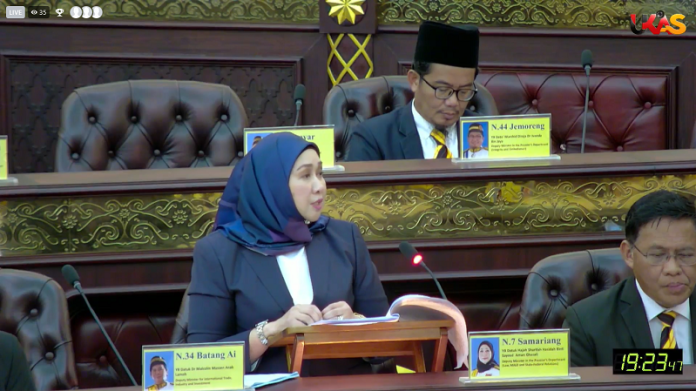ADVERTISE HERE
 Sharifah Hasidah tabling Environment (Reduction of Greenhouse Gases Emission) Bill 2023 in DUN Sitting on Nov 20, 2023.
Sharifah Hasidah tabling Environment (Reduction of Greenhouse Gases Emission) Bill 2023 in DUN Sitting on Nov 20, 2023.KUCHING, Nov 20: The Environment (Reduction of Greenhouse Gases Emission) Bill 2023 will pave the way for Sarawak to have its own complete regulatory framework on clean and renewable energy, including for carbon credits, carbon levy, and carbon emission threshold, before any other state legislatures in Malaysia.
Deputy Minister in the Premier’s Department (Law, MA63 and Federal-State Relations) Datuk Sharifah Hasidah Sayeed Aman Ghazali emphasised that this Bill is introduced as the Parliament has not, in pursuance of Article 76 passed any law to implement its obligations entered by Malaysia under the Paris Agreement and the Sarawak government has not been informed nor consulted concerning any bill been introduced in Parliament to bring into force any provisions of the Paris Agreement in the Federation.
“Therefore, the Sarawak government is taking the initiative to introduce this Bill, aiming to regulate greenhouse gas emissions, promote carbon capture and storage, and mitigate climate change effects to achieve net zero carbon emissions by 2050.
“The subject of ‘environment’ is not explicitly listed in any of the legislative schedules in the Ninth Schedule of the Federal Constitution. As a result, it falls under the residual legislative power of the State Legislature, as outlined in Article 77, and this means that Sarawak may make laws on Environment,” she said when tabling the Bill during the Second Meeting for the Second Term of the 19th Sarawak Legislative Assembly (DUN) Sitting at the DUN Complex here today.
Sharifah Hasidah elaborated that this legislative power covers all matters related to forests and land that are within the boundaries of Sarawak, up to the continental shelf of Sarawak, as well as its right to regulate activities or projects like afforestation and reforestation in the forests to mitigate the effect of climate change and the use of State land for carbon storage, as well as any financial benefits derived from such projects or activities.
To reduce greenhouse gas emissions, the Bill proposes measures such as registration of businesses in scheduled economic sectors listed in the First Schedule, requiring them to submit annual carbon emission reports following international reporting standards.
It also aims to set carbon emission thresholds, and where any registered business entity is unable or unwilling to bring their carbon emissions down to the emission threshold levels, a carbon levy, at a rate to be determined by the Sarawak Cabinet, would be imposed.
Other measures include controlling the flaring and venting of petroleum and greenhouse gases by the oil and gas sectors; promoting forest carbon activities, carbon capture, and storage projects, validated according to Carbon Standards Rules for issuing Sarawak carbon credit units; to comply with international Standards for measuring CO2 potentials of each type of Greenhouse gasses (GHG) based on the latest Inter-governmental Panel on Climate Change (IPCC) Assessment Report as agreed upon by United Nations Framework Convention on Climate Change (UNFCCC); to ensure verification of Carbon Credit Units for Sarawak projects issued by the Carbon Standard Administrator; to register verified Carbon Credit Units in the Sarawak Carbon Registry for trading in voluntary or Emission Trading Markets locally or overseas; to record data on Carbon emission reduction in Sarawak; and to determine the carbon pricing for Sarawak Carbon Credit Units.
“This Bill institutes a robust system for project verification and validation by appointed Carbon Standard Administrators. This system ensures integrity and credibility for all issued carbon credits from Sarawak, augmenting their value and acceptance in compliance and voluntary markets. It also opens avenues for the Government to earn revenue through trading and selling these carbon credits,” Sharifah Hasidah said.
Moreover, she said the Bill provides opportunities for Sarawakians to take part in projects and activities which will mitigate the effects of global warming and to earn carbon credits for their efforts. These activities will also enable the State to have a new source of revenue, which would enhance the State’s capacity to develop in an economically sustainable manner.
Upon passing of this Bill, she said the government plans to establish an Advisory Panel focused on Climate Change, Carbon Capture, Utilisation, and Storage (CCS), Carbon Credits and pricing, emission thresholds, energy transition strategies aiming for net zero by 2050, and other pertinent matters.
Additionally, she added that the carbon emission reduction and carbon credits issued for projects in Sarawak that contribute to mitigating climate change’s effects will be reported to the Federal government to be included in the Nationally Determined Contribution of Malaysia for submission to the UNFCCC.
While this Bill might result in financial implications for Sarawak, which have yet to be determined currently, Sharifah Hasidah explained that once the Bill is passed, the Ministry will collaborate with the State Financial Secretary Office to outline the financial requirements for effectively implementing and administering this Ordinance. — DayakDaily









 English (US) ·
English (US) ·